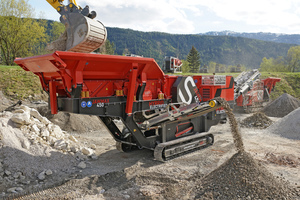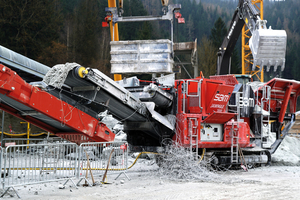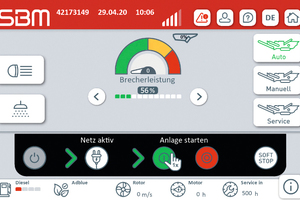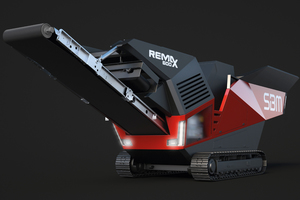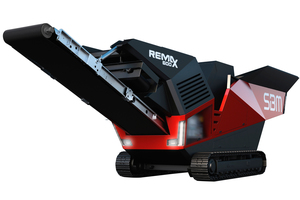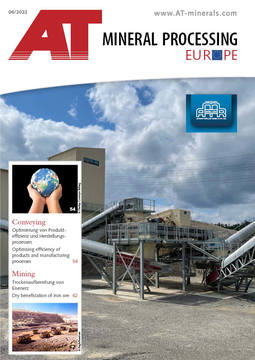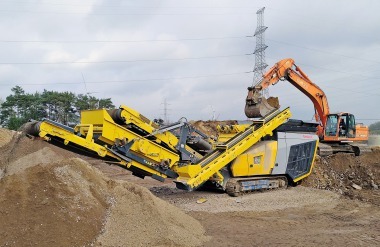Hybrid “by nature”
Uniform concept in all models
In contrast to less stringent hybrid solutions on the market, SBM pursues a uniform concept in its machines that guarantees the major advantages of diesel-electric drive with mains option in all performance classes. At the heart of each is a diesel-generator unit with emission-optimised Cummins diesel engines and directly flange-mounted, maintenance-free generators. The compact drive units are positioned outside the dust-intensive machine zones – in addition, the control cabinets are pressurised as standard and can be heated/air-conditioned for extreme applications. The optional three-phase supply of mains power or alternative external power sources (gen-sets) is connected to the control cabinet and easily and safely activated via a central main switch before the machine starts.
From now on, the central SBM machine control Crush Control automatically takes over the start-up of the individual machine components as well as their monitoring and control in crushing operation. Depending on the model and equipment (pre-screens, discharge conveyors, add-on screens, etc.), up to 20 electric motors with connected loads ranging from 750 watts (sprinkler) to 250 kW (crusher) are installed on the SBM plants. The working hydraulics (crusher adjustment, lifting cylinder, etc.) and the proportional track drive are fed via two separately activated electrically operated pump systems and circuits. This ensures the complete functionality of the plants even in fully electric operation, while at the same time the energy balance is not burdened by the unnecessary stand-by status of the crawler motors, for example. In contrast to diesel-electric systems with significantly more extensive on-board hydraulics, this minimises the required oil quantities on board to only 80 litres, for example, compared to around 200 litres or a good 600 litres for purely diesel-hydraulic models in the 40-tonne class.
Instead of using widely ramified hydraulic piping with high thermal losses or complex oil cooling, all other drives and consumers in SBM systems are “wired” in a fail-safe manner, which largely excludes environmentally critical leakage and corresponding operational failures. Without the diversions via control blocks, the electrical control ensures a continuously fast response of the various system components and enables the simple adjustment of feeder and screening speeds or FI-controlled “extras” such as the automatic cleaning of the conveyor discharge chute.
Efficient and sustainable
The elimination of energy-consuming hydraulic drive components significantly increases the efficiency levels of diesel-electric drives. At around 80 %, it is significantly higher than that of diesel-hydraulic systems without and with optimised load-sensing control (approx. 40 % / approx. 50 %). With mains connection, the efficiency level even reaches over 90 %. Of course, this has a direct effect on fuel consumption: The diesel engines of the SBM systems, which operate at gradually variable speeds (1500 – 1800 rpm), consume a good 40 % less than fully hydraulic systems – the consumption advantage over models with directly driven crushers is still 20 %.
In view of sharply rising fuel prices and despite varying electricity costs, it can be assumed that the 60 % energy cost advantage in all-electric mains operation, which used to be a rule of thumb, has long since shifted further in favour of hybrid technology. Today, SBM even reckons that diesel-electric hybrid systems with a high all-electric utilisation will pay for themselves in full within a few years, thanks to the lower maintenance costs and longer service life due to wear and tear. And this with unrestricted flexibility in autarkic diesel operation, where the SBM hybrids bring further environmental advantages in addition to the lower hydraulic volume and the consumption-dependent lower emissions of their EU-V engines: For example, the elaborately encapsulated diesel/generator units generate low noise emissions without load-related peaks. When switching to all-electric operation, the noise emission of the same plant drops by another 6 dB, which significantly reduces noise pollution depending on the spatial environment.
Even in all-electric “zero-emission” operation, the effects on the immediate working environment are first and foremost in the foreground: while these are obvious in tunnel construction or indoor recycling, in inner-city demolition contracts, for example, more and more value is being placed on exhaust-reduced processes. This makes hybrid plants a real competitive advantage - not to mention the image bonus of a CO2-reduced company footprint.
Hybrid 4.0
SBM Mineral Processing will demonstrate the development possibilities offered by its own electrified processing technology with the new track-mounted impact crusher REMAX 600 announced for this autumn. The new 60-tonne plant in the spectacular “stealth” design is to take the decisive step from crushing, which is already largely monitored today and optimised in the interaction of all process steps, to autonomous, fully automated mobile processing.
The “intelligent crusher” uses all the advantages of the all-electric SBM drive system and modern detection and communication technology. Via sensors, the machine automatically checks the feed material and end products, records the load conditions of the crusher and conveying equipment and optimises all separation processes up to the overband magnets and air separators. The advanced SBM control system Crush Control validates all operating states and material properties in real time, compares the values via a cloud solution with thousands of reference data stored at SBM and automatically makes any necessary adjustments (crushing gap, rotor speed, etc.). The world premiere of the “intelligent” REMAX 600 is planned for October at bauma 2022 in Munich.

